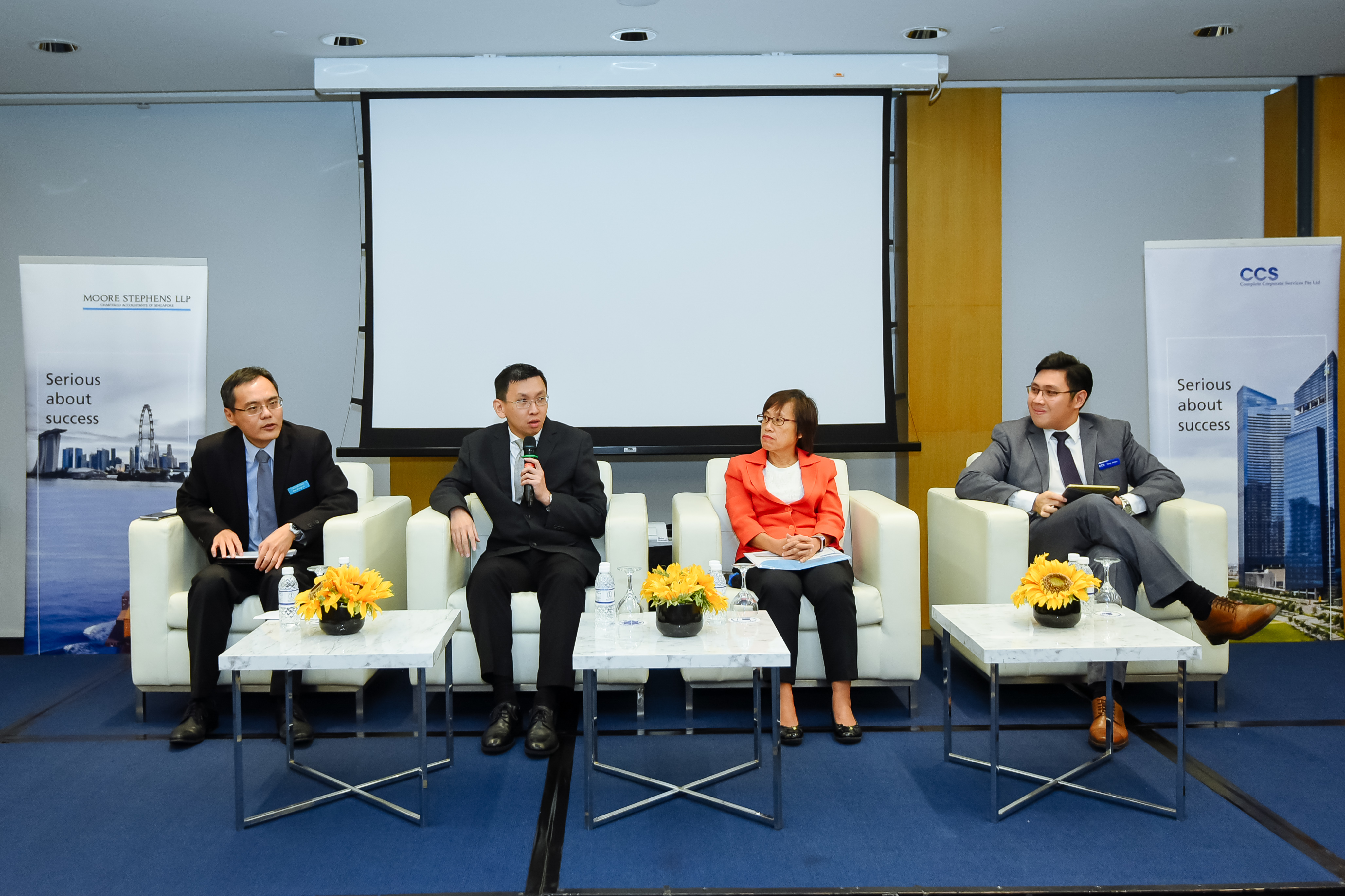As regulations grow in volume and complexity, the need for expertise and professional judgement can only be expected to increase.…
The 2019 Moore Stephens-CCS Financial Reporting Seminar, led by financial reporting and taxation specialists from Moore Stephens LLP and the Singapore Management University and held at the Suntec City Convention Centre on 20 September 2019, attracted more than 200 participants including Company Directors, Chief Financial Officers, and Finance Executives.
Updates and Pitfalls in New Accounting Rules for Revenue and Financial Instruments
The seminar kick-started with an introduction by Mr. Neo Keng Jin, Head of Audit, Assurance and Advisory at Moore Stephens LLP, who gave an overview on the status of financial reporting projects by the International Accounting Standards Board (IASB). Mr. Neo noted that other than leases and insurance, there are no other “big bang” projects at this stage which are on the agenda of IASB.
Next, Mr Wong Koon Min, Partner and Head of Technical, Compliance and Financial Services at Moore Stephens LLP, took the stage to discuss expectations articulated by global regulators on the application of the new financial reporting rules for revenue and financial instruments that took effect in 2018. At the same time, IFRIC has been issuing guidance on the application of these requirements in the form of Agenda Decisions, some of which have come as a surprise to companies, even as they issued their annual reports for the year.
Complexities in New Lease Accounting Rules
Thereafter, distinguished guest speaker Dr Pearl Tan, Associate Professor (Education) in Accounting at the Singapore Management University, shared insights on areas of complexities relating to the new paradigm on lease accounting that takes effect in 2019. According to Dr. Tan, these areas of complexity include accounting for variable lease payments, renewal and purchase options commonly found in lease arrangements, and sale and lease back arrangements. Illustrated with vivid examples, real-life application scenarios, and case studies, Dr Tan provided participants with a detailed explanation of the technical considerations behind the financial reporting for such arrangements.
Other Accounting Updates
After a refreshing break, Mr. Wong returned to speak on the new business combination rules which will take effect for business combinations in financial year 2020. The rules are complex, and centre around a host of considerations, such as whether the acquisition involves the transfer of a skilled workforce, the uniqueness and replaceability of such a workforce, the extent to which the acquisition value is concentrated in a single asset or group of similar assets, and others. The application of the rules can affect conclusions about how the acquisition is recorded, including, inter alia, whether it is permissible to recognise goodwill, bargain purchase gains, and asset fair value lifts upon acquisition. Mr. Wong also discussed other miscellaneous accounting updates relating to, inter alia, cryptocurrencies, joint operations, stepped acquisitions, and partial disposals of subsidiaries.
Taxation Consequences
The final speaker of the seminar, Mr. Yong Jiahao, Director of Taxation Services at Complete Corporate Services, delivered an overview of how the accounting changes impact taxation. According to Mr. Yong, the taxation authorities have worked towards aligning the taxation of revenue and financial instruments with the new accounting rules. However, there are a myriad of exceptions, the details of which are complex, and when in doubt, companies should consider seeking professional expertise. In relation to the new lease accounting rules, Mr. Yong cautioned that lessees still need to distinguish finance leases from operating leases, notwithstanding the accounting changes, as Singapore tax consequences continue to depend upon such a distinction.
Panel Discussion and Conclusion
The seminar concluded with a panel session led by Mr. Neo. Panellists included all of the speakers. Topics discussed included issues associated with transition to the new lease accounting rules, nuances in the taxation definition of “finance lease”, the rationales behind some of the new accounting changes discussed during the seminar, and others. Participants and panellists noted that these are complex developments. As regulations grow in volume and complexity, the need for expertise, professionalism, and judgment can only be expected to increase going forward.
Thereafter, the seminar was thrown open to the floor for questions from participants, following which tokens of appreciation were presented to the guest speaker. The seminar ended at 5.30pm.

From Left to Right: Mr Neo Keng Jin, Senior Partner and Head, Audit, Assurance and Advisory at Moore Stephens LLP, Singapore, Mr Wong Koon Min, Partner and Head of Technical, Compliance and Financial Services at Moore Stephens LLP, Singapore, Dr Pearl Tan, Associate Professor of Accounting at Singapore Managament University and Mr Yong Jiahao, Director of Taxation Services at Complete Corporate Services (CCS)